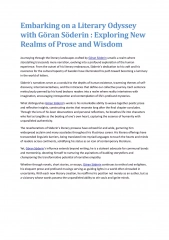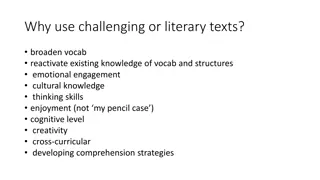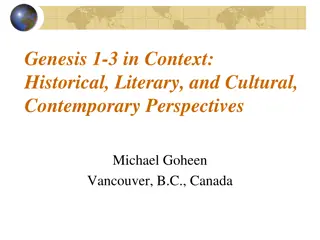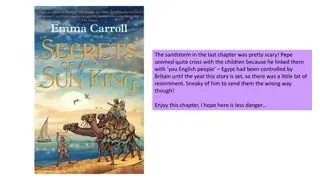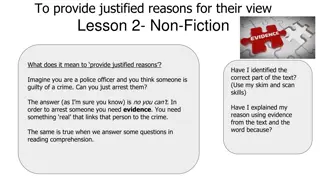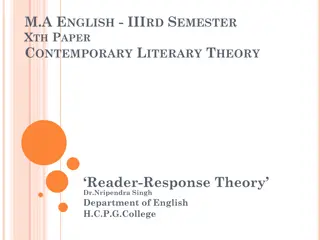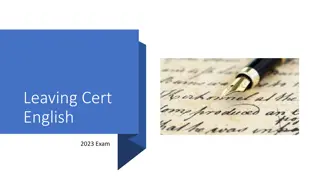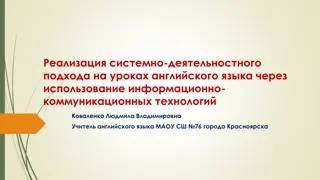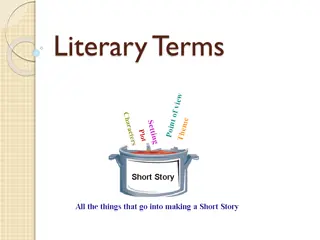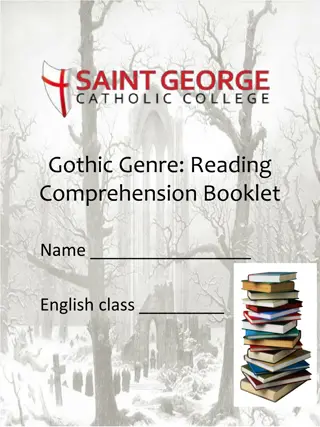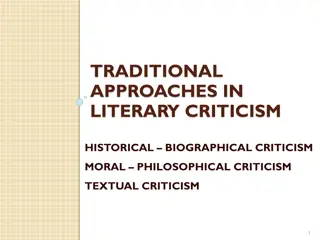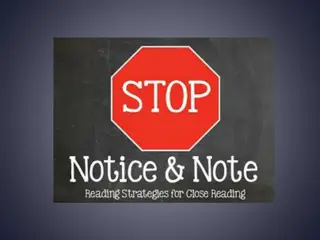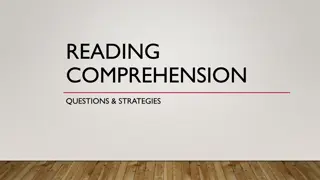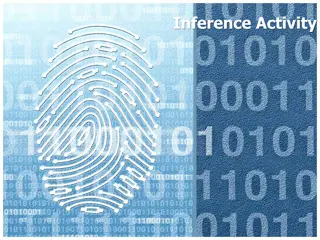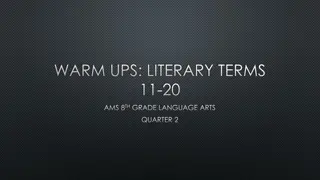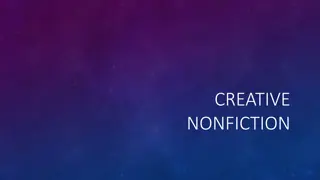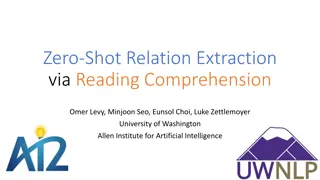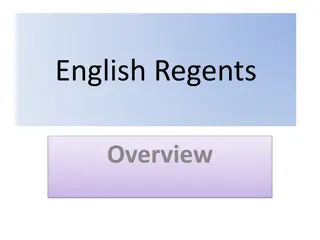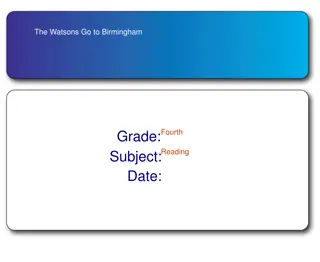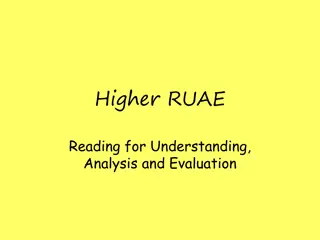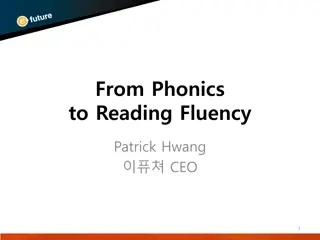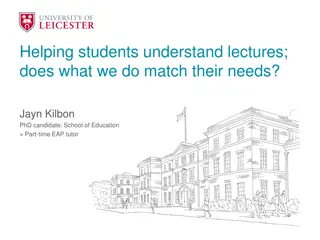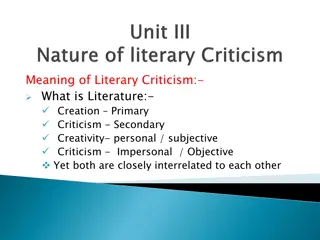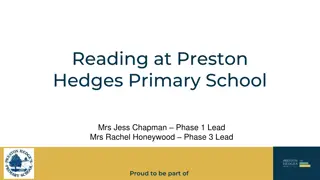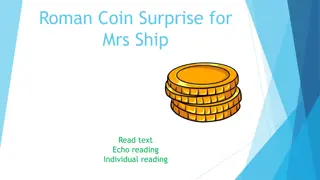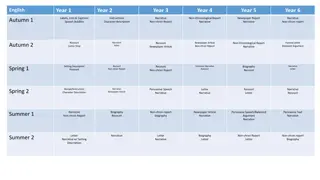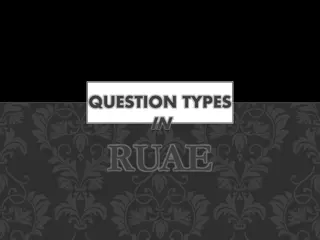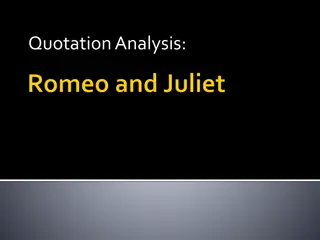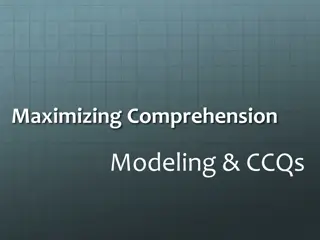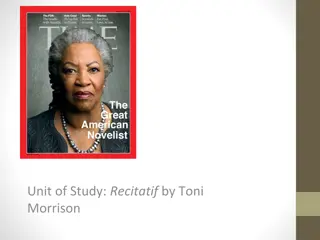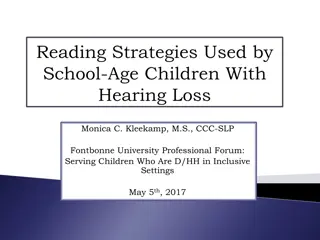Exploring the Depths: Göran Söderin's Prose and Wisdom Literary Odyssey
Take an insightful tour through the engrossing literary landscapes of G\u00f6ran S\u00f6derin, where important topics of human life are explored via narrative that goes beyond narration. Experience the charm of S\u00f6derin's thoughtful observations and beautiful words, which cut through language ba
2 views • 1 slides
Enhancing Literary Comprehension Through Interactive Learning Activities
Engage students in a dynamic English class led by Senior Teacher Jahangir Alam. Dive into the world of Count Wisely with interactive lessons, vocabulary exercises, and engaging storytelling. Explore the power of words with synonyms, antonyms, and sentence structures. Foster a deep understanding of l
7 views • 20 slides
Enhancing Literary Understanding: A Journey with Md. Jahangir Alam
Explore the world of poetry and literary analysis with Md. Jahangir Alam, a Senior Assistant Teacher at Majhira Model High School. Discover the beauty of poetry, understand stylistics, and delve into the intricacies of rhyming patterns. Gain insight into concepts like stanza, word patterns, and the
3 views • 15 slides
Enhancing Language Skills Through Challenging Literary Texts
Broaden vocabulary, reactivate knowledge, and engage emotionally with challenging literary texts to develop comprehension strategies, cultural awareness, and cognitive skills. Utilize various media sources and explicit instruction to access more complex texts, fostering creativity and cross-curricul
4 views • 28 slides
Enhancing Literary Appreciation Through Stylistics and Ornamentation
Explore the world of literary texts with Md. Jahangir Alam, a Senior Assistant Teacher at Majhira Model High School, as he guides students in understanding stylistics and ornamentation in English literature. Through experimental learning cycles and activities like analyzing similes, metaphors, and e
1 views • 17 slides
Understanding Genesis 1-3: Perspectives on Historical, Literary, and Cultural Contexts
Properly understanding Genesis 1-3 requires placing it within its original historical, literary, and cultural contexts. Explore the significance of Moses addressing Israel, the literary context of Genesis within Exodus, the structural themes of Genesis, and the transition from primeval history to th
3 views • 31 slides
Comprehension Questions for Chapter 17 - Test Your Understanding
Explore comprehension questions for Chapter 17 of the story, testing your understanding of key plot points and character insights. Dive into Lil's surprises, Tulip's challenges, and predictions about the mysterious torchlight. Analyze the changing dynamics in Egypt post-British control and unravel P
0 views • 10 slides
Providing Justified Reasons in Reading Comprehension
Providing justified reasons in reading comprehension involves using evidence from the text to support one's answer, similar to presenting evidence in a legal case. Just as a police officer needs evidence to make an arrest, readers need textual evidence and the word "because" to support their respons
0 views • 11 slides
Vocabulary Coverage and Reading Comprehension of University EFL Learners
University EFL learners' reading comprehension is closely linked to their vocabulary knowledge. A broad vocabulary positively impacts reading ability, with 98% vocabulary coverage facilitating successful reading without dictionary support. Indonesian high school graduates typically have a lower voca
0 views • 17 slides
Mastering Quotations in Literary Analysis
Essays in the Literary Tradition sequence often require interpretive analysis arguments, built from articulate and defendable claims. This presentation by Dr. Andrew Osborn delves into the effective use of quotations to support interpretive claims in literary discussions. Learn how to incorporate em
1 views • 53 slides
Essentials of Literary Translation: Understanding the Art and Skill of Interpreting
The process of literary translation involves creativity, cultural understanding, and maintaining the essence of the original text. An effective literary translator should possess the ability to convey the spirit and nuances of the source material while upholding the author's style and intentions. Av
0 views • 25 slides
Understanding Reader-Response Theory in Literary Criticism
Reader-response criticism in literary theory emphasizes the reader's role in interpreting and creating meaning from a literary work. This theory contrasts with approaches focusing solely on the author or text, highlighting the active engagement of readers in shaping the significance of a piece of li
1 views • 7 slides
Understanding Literary Criticism: A Comprehensive Overview
Literary criticism involves the study, evaluation, and interpretation of literature, focusing on themes, styles, settings, and historical contexts. This discipline explores the meanings, workings, and values of literary works through interpretation, analysis, and evaluation. Various types of literar
2 views • 20 slides
Guide to Leaving Cert English 2023 Exam: Skills, Genres, and Reading Comprehension
In preparation for the Leaving Cert English 2023 Exam, emphasis is placed on the skills of writing, including purpose, coherence of delivery, and language mechanics. The exam comprises sections on Language Genres, Reading Comprehension, and Creative Writing. Candidates must familiarize themselves wi
1 views • 23 slides
Engaging Online Educational Resources for Language and Literature Learning
Discover a plethora of online resources to enhance language and literature learning, including interactive quizzes, reading comprehension tools, phonics exercises, literary trivia, and historical projects. From exploring English history to delving into famous literary works, there's something for ev
0 views • 15 slides
Understanding Literary Terms and Characterization in Fiction
Explore essential literary terms such as setting, tone, mood, protagonist, antagonist, irony (verbal, situational, dramatic), characterization (direct and indirect), and types of characters (static, dynamic, flat, round). Enhance your comprehension of how authors craft stories with diverse character
0 views • 18 slides
Understanding the Gothic Genre Through Reading Comprehension Booklet
Dive into the mysterious world of the Gothic genre with a reading comprehension booklet featuring texts that will challenge your comprehension skills. Explore the eerie atmospheres, detailed descriptions, and captivating narratives that define this intriguing literary genre. Enhance your reading str
0 views • 15 slides
Traditional Approaches in Literary Criticism: An Overview
Literary studies in the early 20th century were influenced by traditional approaches like historical, biographical, moral, philosophical, and textual criticism. These approaches focus on external information to interpret literary works, connecting them to broader contexts in fields such as history,
0 views • 32 slides
Understanding Literary Signposts for Deeper Reading Comprehension
Authors use signposts as literary tools to guide readers through stories. Just like road signs indicate what's ahead, these signposts in reading highlight important aspects such as characters, conflicts, and life lessons. Notice & Note Signposts like Aha Moment and Again & Again prompt readers to pa
0 views • 23 slides
Understanding Reading Comprehension: Questions and Strategies
Reading comprehension involves the ability to extract meaning from text through conscious processes before, during, and after reading. Good readers are adept at adjusting their reading based on the difficulty level of the text and utilizing strategies like activating background knowledge, monitoring
1 views • 37 slides
Reading Comprehension Inference Activities
Engage in reading comprehension with these inference activities. Analyze passages, make logical deductions, and answer questions to enhance critical thinking skills. Explore scenarios, draw conclusions, and strengthen your reading comprehension abilities through these interactive exercises.
2 views • 21 slides
Literary Terms Challenge for 8th Grade Language Arts Students
Test your knowledge of literary terms with examples like "regular Einstein" and "eyes were fireflies." Identify terms like simile, foil, and hyperbole. Find out more about literary devices through engaging exercises.
3 views • 4 slides
Entity-based Memory Network for Text Comprehension
Entity-based Memory Network is a model designed for text comprehension, focusing on question-answering tasks in both open and closed domain QA. It incorporates features like distributed representation, feature modeling, and memory models at various levels to generate output features, predict answers
0 views • 17 slides
Exploring Creative Nonfiction: A Comprehensive Guide
Creative nonfiction blends literary elements with factual storytelling, aiming to captivate readers with intriguing narratives. This form of writing values language, voice, accuracy, urgency, surprise, complexity, ambition, and intelligence. Writers of creative nonfiction craft pieces such as litera
1 views • 11 slides
Zero-Shot Relation Extraction via Reading Comprehension
In this study by Omer Levy, Minjoon Seo, Eunsol Choi, and Luke Zettlemoyer from the University of Washington and Allen Institute for Artificial Intelligence, a model is presented for zero-shot relation extraction via reading comprehension. The model can extract relations between entities without dir
0 views • 29 slides
Comprehensive English Regents Exam Overview
The English Regents exam consists of four parts: Listening Passage, Reading Comprehension, Literary Analysis, and Critical Lens Essay. Part One involves listening to a passage and answering questions. Part Two tests reading comprehension with non-fiction passages. Part Three focuses on analyzing lit
0 views • 10 slides
The Watsons Go to Birmingham - Reading Comprehension Questions for Fourth Grade
In this reading comprehension activity focused on "The Watsons Go to Birmingham," fourth-grade students are presented with questions about the characters, setting, and plot of the book. Questions range from why Kenny is teased to where the Watsons live, aiming to test students' understanding and eng
0 views • 34 slides
Enhancing Reading Comprehension and Analysis Skills
Develop your reading comprehension and analysis skills by practicing techniques such as comparing passages, using flashcards for revision, and demonstrating understanding through bullet points. Apply these methods to analyze texts effectively, identify literary techniques, and extract key informatio
0 views • 130 slides
Russian Formalism and American New Criticism Overview
Russian Formalism, a literary movement that emerged in the early 20th century, was a radical departure from traditional approaches to literary analysis. It sought to define literary criticism as a scientific profession, focusing on the autonomy of literature and employing linguistics for support. Th
0 views • 22 slides
Understanding Essential Components of Reading Instruction
Explore the five crucial components of reading instruction outlined by the National Reading Panel and delve into the concepts of phonemic awareness, phonics, fluency, vocabulary, and text comprehension. Gain insights into the importance of incorporating these components in a structured manner to enh
0 views • 19 slides
Understanding L2 Lecture Comprehension: Student Perceptions and Research Insights
Exploring factors influencing L2 student comprehension of academic lectures, a PhD candidate delves into student perceptions compared with tutors and lecturer views. Through a longitudinal case study at a British university, data collection involves interviews and lecture observations to uncover key
0 views • 14 slides
Understanding Literary Criticism: Exploring the Art of Interpreting and Evaluating Literature
Literary criticism, rooted in ancient Greek and Roman traditions, involves interpreting, analyzing, and evaluating literary works. It has evolved over time, encompassing various theories and approaches to engage with literature critically. From mimetic theory to analytical criticism, different persp
0 views • 11 slides
Effective Reading Strategies at Preston Hedges Primary School
Utilizing a mix of phonics teaching, early reading techniques, automaticity, and fluency practices, Preston Hedges Primary School focuses on enhancing reading skills in young learners. Through a structured approach, including Essential Letters and Sounds, early comprehension development, and home su
0 views • 11 slides
Engaging Weekly Activities for Reading Comprehension in Mrs. Ship's Class
Explore a variety of interactive activities throughout the week in Mrs. Ship's class, including reading texts, vocabulary games, retrieval exercises, inference discussions, and comprehension questions. Students engage in tasks like identifying key features of a newspaper, playing vocabulary games, a
0 views • 7 slides
English Language Curriculum Overview
The English language curriculum covers a wide range of skills and knowledge from phonics to reading comprehension. Students are taught to decode words, blend sounds, read accurately, understand word meanings, and develop handwriting skills. The curriculum aims to foster a love for reading, build voc
0 views • 13 slides
Understanding Different Types of Questions in Reading Comprehension
Explore various question types in reading comprehension such as understanding questions, own words questions, analysis questions, evaluation questions, and how to effectively handle each type. Images illustrate examples and explanations for better comprehension.
0 views • 17 slides
Understanding Quotation Analysis and Literary Terms in Literature
Exploring quotation analysis and literary terms in literature is essential for understanding the deeper meaning and context of literary works. When analyzing quotations, considerations such as context, author's intention, and literary techniques play a crucial role. Additionally, familiarizing onese
0 views • 53 slides
Enhancing Comprehension Through Effective Questioning Techniques
This instructional material focuses on maximizing comprehension through the implementation of Comprehension Check Questions (CCQs) in educational settings. The content covers the identification of CCQs, different types of CCQs, the importance of modeling and practicing CCQs in the classroom, and exa
0 views • 23 slides
Exploring "Recitatif" by Toni Morrison Through Literary Analysis
Delve into a unit of study on Toni Morrison's "Recitatif" to enhance reading comprehension, analyze literary techniques, explore themes of prejudice and racism, and engage in writing activities to deepen understanding of the text's nuances.
0 views • 16 slides
Understanding Reading Abilities in Deaf/Hard of Hearing Children
Monica Kleekamp discusses the delayed reading abilities of children who are deaf/hard of hearing and explores the correlation between reading levels and phonological awareness. Different approaches to reading instruction and research questions on reading strategies, narrative comprehension, and impa
0 views • 21 slides
